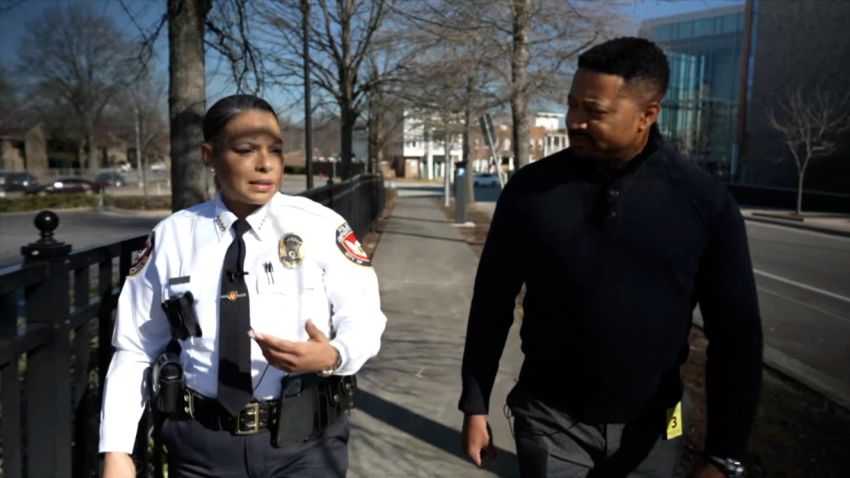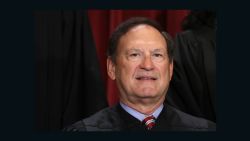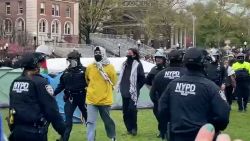In a growing number of American cities, if you call the police, there are fewer officers taking the call.
Police departments across the nation are raising concerns about current and future staffing levels. CNN reached out to nearly 20 departments nationwide, along with other key stakeholders including elected officials, union officials and outside recruiters for departments for this story.
They all point to similar concerns including Covid-19, the great resignation, the climate for law enforcement and local reform efforts that are making recruitment and retention difficult.
The challenges have led the chief of police in Durham, North Carolina, to join her officers in patrolling her own city. The department is down 90 officers out of a budgeted force of 627. The department has started to offer a $5,000 bonus for new hires to fill its ranks.

“It’s been tough,” Chief Patrice Andrews said of the current staffing issues facing her city. “We’ve had to be very creative with staffing, you know, putting investigators and those that typically wouldn’t necessarily be taking 911 calls, putting them back on the street.”
“The 911 calls don’t stop. People are still having emergencies, the emergencies don’t stop and certainly the emergencies don’t care if you are 60% staffed or below,” Andrews told CNN while she was on patrol. “This profession is, is something we were all called to do and not everyone is meant to be the police. This profession is certainly a noble one, even yet and still, despite everything, this profession is certainly noble.”
A national survey from June of 2021 found that departments around the country on average were filling 93% of budgeted positions available, according to the Police Executive Research Forum.
“You’ve got a workforce that’s being compressed on the front end, you’ve got a drop in people who want to be cops. And on the other end, you have a significant increase in people who are resigning and retiring. And we have a survey that we did (that found a) 44% increase in retirements, 18% increase in resignations (in police departments),” according to Police Executive Research Forum President Chuck Wexler.
On average, officers spend 8 months training before they can patrol the streets alone, according to the Bureau of Justice Statistics. Meaning, it will take years to fill the open jobs at departments across the country, Wexler said.
“It’s a trying time to be a police officer in this country,” Wexler said. “So, police chiefs are wondering who are going to be the cops of the future.”
Departments are also struggling daily to cover those out sick due to Covid-19, and higher rates of crime, Wexler and several departments said.
In Philadelphia, the department is down 440 officers or 7% of the number of police officers budgeted for the city, the department told CNN.
“Well, right now it’s not a very desirable job,” John McNesby, head of the Philadelphia Fraternal Order of Police (FOP), told CNN. “Everything that’s been going on around the country for the last couple of years. … But right now, I mean just getting people to apply is a monster in itself.”
During a recent recruitment event, 600 people said they would attend, only 200 showed up and only 26 moved on to the physical assessment phases, McNesby said. The FOP also points to a recently passed requirement that requires all applicants to have lived in the city for at least a year, as an additional challenge to find new officers in the city of brotherly love.
In Atlanta, which like many cities in America also saw unrest in the wake of the murder of George Floyd, two incidents of police use of force also put pressure on the local community. Community outreach events like Clippers and Cops, held in local barbershops around the city, are trying to “bridge the gap” between the community and the police. The events allow officers to open a dialogue between themselves and the citizens who they serve and protect, participants say.

During an appearance at the event this month, Andre Dickens, the newly elected mayor of Atlanta, said he is working to get the police department back to full strength.
“The goal is to be smart on crime, and so we have to have a balanced approach to safety and justice,” Dickens said. “That means getting more officers in because we lost about 400 to 500 officers over the past three years. So I’m trying to get those 400 officers back, but training them in conflict resolution and skills on how to de-escalate issues so that they can be better community-based cops.”
The mayor said a number of issues contributed to the decrease in the rank and file. “There was a morale challenge across the last couple of years with Covid and with a lot of issues related to police, excessive use of force that went unchecked, but then … everybody said get rid of police and these sorts of things,” Dickens said.

The founder of Clippers and Cops was one of those 400 officers who left the department. Detective Tyrone Dennis retired from the force in August 2020, moved back to St. Louis, Missouri, to be with his family and took a job as a director of school safety, a job that paid more than being a police officer.
“They got to do better with pay … incentives to retain officers,” he said. “It would be foolish for me to stay for $48,000. When I have a wife and three kids to feed for $48,000. I can almost qualify for public assistance. That’s not cool,” Dennis said.
“Basically we’re one bullet away from death, and one mistake away from indictment so why roll the dice with my future when I can go do something else?” Dennis said.
Police leadership also say that pay should be more in line with work requirements. “When you think of what the line of work calls for and what they’re having to do, they’re wanting to be compensated, you know, but also to they’ve got to be able to support their families. You know, we have officers that can’t even qualify for apartments because their, their income doesn’t match up with what the apartments require. That’s a problem,” Andrews said.
In Phoenix, the police department is sending detectives and officers from various specialty assignments to patrol. Last month, the department started to take additional reports virtually rather than send officers out, police department spokesperson Sgt. Andy Williams told CNN.
The police department is down 13% of its allotment of officers, according to data provided by Phoenix Police to CNN.
It is offering hiring bonuses of up to $8,700 dollars for new hires with college degrees, the department said.
In Winston-Salem, North Carolina, Police Chief Catriana A. Thompson says the situation is “alarming.” The department is down 96 officers or 18% of its allotted force. Some of the department’s “specialized units have been disbanded temporarily until staffing levels improve,” Thompson told CNN in a statement.
Reliant Hiring Solutions, a firm that works with law enforcement around the country to set up job fairs, said it was more difficult to find recruits in more “liberal cities,” Randall Blanchard, told CNN.
In Seattle, the department is experiencing “unprecedented” losses of staff, the department told CNN. The department is short more than 225 officers or 17% of its workforce.
“Our losses over the last two years have been unprecedented,” police department spokesperson Sgt. Randy Hyserik told CNN. “Many of our newer officers separated from our department and moved to smaller agencies in the area, and some left law enforcement altogether. In their exit interviews, many cited the ‘defund’ movement and a lack of support from local elected officials as their reason for leaving our department, or for leaving law enforcement completely.”
Seattle’s attrition rate has over doubled in the last two years. Prior to 2020, the annual attrition rate was 70 to 75 officers a year. The department has had 356 officers leave over the last two years, according to data provided to CNN by the department.
People that call police for non-life-threatening calls may have to wait longer for a response, unless staffing levels are improved, “you may be lucky if you get an officer 2, 3, 4 hours down the line,” McNesby said.
“I mean it’s easier for me to sit here and talk about it,” McNesby said, “but it really affects the people standing at roll calls in the morning when they look to the left and look to the right and there’s nobody else there … or you have a citizen that’s on the line … where they feel the need for police attention and they dial 911 and you’re not getting anybody coming.”
CNN’s Kevin Conlon contributed to this report






















